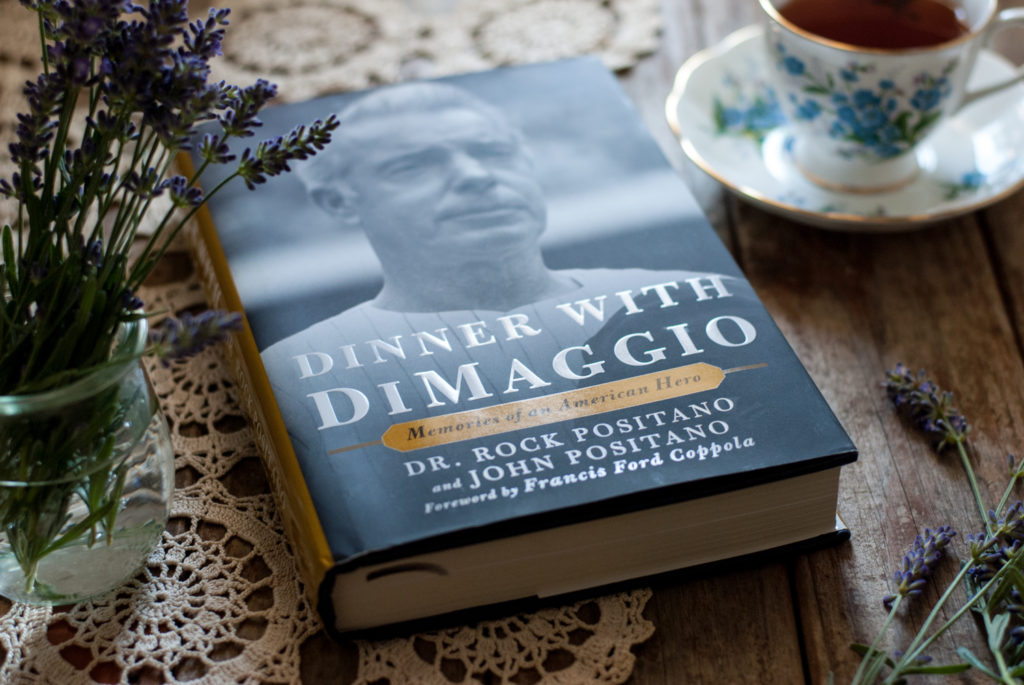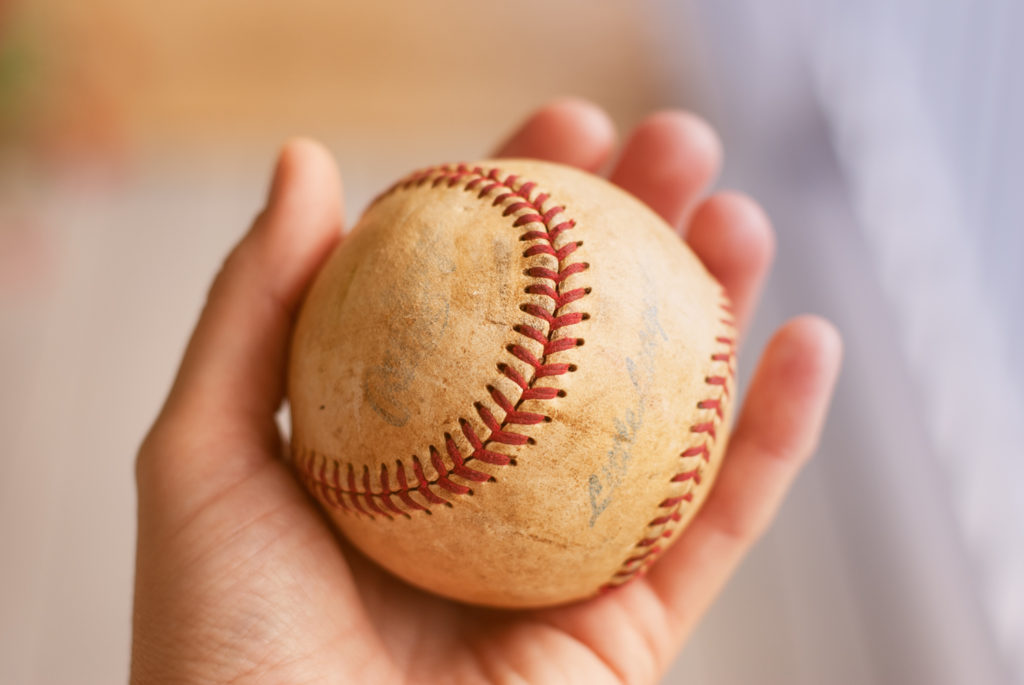Joltin’ Joe DiMaggio
I have always said that the best stories are not just a single flavor. They force us to run the entire gamut of emotions– we cry true tears, we laugh uproariously at the funny parts, and sometimes we just purse our lips and sigh, “Hmm. Yes. Exactly like that. I know exactly what you mean.” The most beloved stories, movies, and books, all have that same theme– we can relate to them on a level that is deeper than most things we encounter. The richness of the story causes us, even if just for a brief moment, to leave the trials and worries of our own lives and be transported magically into the pages and mind of another story, another life, and another world.
Sometimes you read a story that is just so poignant– so good, that you have to share it. Yes. You might be a food blogger. But if a book is this incredible, and you loved it so much that you know it will haunt you for years, then I think you can tell about it (on said food blog because food blog is written by your brain, and your brain is still lost in the magic of said book) and be forgiven. 😉 And that book, my friends, is Dinner with DiMaggio— a book so phenomenal that I finished in 2 days and then immediately started it again. All of my favorite books have joined an exclusive club– when I finish them I immediately start them again. Very few books have been splendid enough to cause this reaction within my little former English teacher heart, but this book was one of the few and the proud.
From the first moment, I knew. It was love at first page.

Where I grew up near Pittsburgh, PA, everyone (and I mean EVERYONE– even infants!) rocked the black and gold for the Pittsburgh teams. On game nights the stadiums were packed with fans, the streets lined with the colors of those who could not get in, listening in groups to the games on the radio. Our TV at home was always tuned to the Steelers, Penguins, and Pirates games. No matter how they did Pittsburgh was the home team, and we were die-hard fans.
My family’s (especially my mom’s) love of sports didn’t stop there, though Pittsburgh was always the team we rooted for. Even on years where Pittsburgh didn’t make the playoffs (sadly, there were more than I care to admit) we watched the other teams. My mom always said, “This is the best kind of sports because when you don’t care who wins or loses you can just enjoy the game and not care about the outcome.” And you know what? The commercials and snacks are still just as good during the Superbowl even when your team isn’t playing. Oh– pass the chips. Thanks.
We loved sports movies too. I remember watching the old black and white movie “The Pride of the Yankees,” which tells the tragic story of Yankee hero Lou Gehrig whose career and life were tragically cut short by the disease which now bears his name. He gave his “Luckiest Man” speech in the heart of Yankee stadium, while the fans and his teammates stood in silent support, stunned. He died a few weeks short of his 37th birthday after setting records that still stand today for 23 career grand slam home runs, most RBI’s in a single season (184), and until 1995, the record for the most consecutive games played (2,130). The “Iron Horse” was incredible; I can only imagine the career he would have had if disease had not claimed his life.
Lou’s locker mate was Joe DiMaggio– an Italian American who was just starting his career as Gehrig was finishing it. Joe noticed that Lou (who was always unfailingly prompt and detail conscious) started showing up late to practice. His normally flawlessly clean image was sullied because his hair was not combed properly; it was also evident that he was having trouble shaving without cutting himself. He had trouble tying his shoes and would sit there, helplessly willing his fingers to work while the rest of the team raced onto the field. He started dropping things– from what should have been easy catches to even his own mitt when he tried to put it on his hand. DiMaggio noticed all of this but said nothing. One day Joe came back to the locker room after practice and found Gehrig alone, slumped against his locker. Gehrig turned to DiMaggio and told him, “Joe, I don’t think I can play baseball anymore. I want to take myself out of the lineup before McCarthy takes me out.” The two legends– one coming and one going– stared at each other. Gehrig started to weep. DiMaggio also cried. Neither one talked about it, but they both understood. Gehrig would pass away not even 2 years later after a valiant fight with the disease that was eventually named after him.

Baseball was the game of America, then. A country still reeling from the Great Depression and afraid there was going to be another world war needed something to bring them together– something to believe in. Baseball became that unifying factor that everyone– even immigrants who barely spoke English, such as DiMaggio’s own father– could love and understand. Guiseppe DiMaggio always said that “real men work– they don’t play games” until not one, not two, but three of his sons became MLB players. When he saw their paychecks (the Yankees actually gifted Joe a sailboat called “The Clipper” in appreciation of his dazzling skill), Guiseppe learned baseball overnight and changed his mind.
Joe DiMaggio went on to become a legend in his own right, setting (and still holding) many MLB records. Perhaps his most incredible record was his famous 56 game hitting streak, a feat which Harvard’s Stephen Gould called “the most extraordinary thing that ever happened in American sports.” Even more mind boggling is the fact that DiMaggio’s batting average was .408 during the streak. Yankee stadium, “The House that Ruth Built,” was famously long and therefore a notoriously difficult place to get a home run– the fences were just too far. Since DiMaggio’s time the fences have been moved inward to make the stadium more consistent with other stadiums. But in DiMaggio’s day sportscasters have estimated that nearly 200 runs were lost to DiMaggio just because of the extra length of the stadium during the time that he played. If Joltin’ Joe hadn’t played in the cavernous Yankee stadium, and if he hadn’t served his country during WWII (losing 3 seasons of baseball in the process), his stats (which are still legendary to this day) would have been even more incredible.
I think perhaps most interesting to me– and the reason I loved the book so much– was learning about the kind and humble person that Joe DiMaggio was. The book described the man behind the legend– the man who was bigger and better than his baseball records and so much more than just the second husband of troubled star Marilyn Monroe, whom he truly loved and missed until the day he died.

Reading the book (written about the 10 year friendship that evolved between Jo Di and his trusted physician, Dr. Rock Positano) was like taking a step back in time and being given a rare and beautiful glimpse into Mr. DiMaggio’s life and seeing how his upbringing, values, and careful attention to detail and loyalty to those he cared about made him so much more than just a ballplayer. Mr. DiMaggio could be gruff at times– he grew up in a time where people were respectful and much more classy. He detested when people would come up to him and call him “Joe” without ever having met him or asked his permission to use the informality of a first name. He grew up during a time when Italian Americans were looked down on– when even the coaches and commentators of games used racial slurs to call to Hispanic and Italian players. Many Italians were forced to their names to “Smith” or “Foster” to get employment, but DiMaggio refused. He was a trendsetter who proudly wore his heritage and helped others to be proud to use their real names in places of business and sports. Slowly, and largely because of his influence, times began to change.
I found myself smiling as I read– Mr. DiMaggio reminded me so much of my grandpa– a man who could come off as a little gruff at times, especially when enforcing his privacy (which he guarded jealously), protecting his family, or teaching his grandchildren about the way he believed life should be. And yet underneath all the bluster there was a soft, sweet, caring person who loved us and just wanted to protect us from the hardships that he had endured. There was something magical about “The Greatest Generation”– those who served in WWII and learned what it meant to “take it on the chin” and accomplish goals despite incredible hardship and pain. They carried that mindset throughout life– suffering silently and nobly without complaint, often until the end of their lives. As I’ve heard many people say (and I concur), “They just don’t make ’em like that anymore.”
The reason I found this book so magical was not so much the baseball facts and trivia (although that was interesting), but just the study on human nature that it so beautifully and caringly presented throughout the pages. As I read I was touched by the many personal details– such as how the Yankee Clipper liked his coffee (Half decaf, half hot water, always meticulously poured together without wasting a drop), and how he was never “too important” to do even the most menial task to help a friend. He often offered to pick up the doctor’s clothes from the cleaners, served pizza to kids, and even volunteered to wait 5 hours for a furniture delivery for the doctor’s office. When the deliveryman arrived he spluttered “Holy &^$% you’re Joe DiMaggio!” And Joe without missing a beat said, “Yes I am. And according to my Joe DiMaggio wristwatch you are 5 hours late. Young man, even if no one notices or appreciates what you do, you should still do your best work every day– for yourself. Be your own boss and be your best self every day.” He signed the receipt, “Best wishes and don’t ever be late again. — Joe DiMaggio.”

He was unfailingly polite and respectful to ladies (he insisted on wearing a tie and jacket each time a lady was dining in the party, and would make other gentlemen in the party go home to change before he would allow them to join the meal, if they forgot). He refused to ever divulge damaging information about women with whom he had relationships, never bringing up their affairs or faults no matter who asked. He kept his word no matter what– he was what the Italians call “La Bella Figura“– the beautiful figure. He made sure that he never “sold out” his image to someone, just to get rich. It was more important to present a wholesome image for the young people he knew looked up to him. Imagine if sports figures were that way today– if they cared more about the impressionable minds looking up to them instead of their colossal salaries and partying until they got arrested. I was touched by the beautiful manners of yesteryear and became a little nostalgic for a time that I wish still existed.
Joe DiMaggio was not perfect. He did go through 2 divorces and had trouble raising his son. But for all his mistakes there was something so beautifully human about him. Even though he had problems, he did all he could to make them right. When he was unable to help his son, Joe instead dedicated his life to helping raise his granddaughters in their father’s absence. When his marriage with Monroe ended he never stopped trying to reconcile. At the time of her death the couple was planning to be remarried. Marilyn remarked that “Joe is like a lifeguard in my life. Every time I think I’m drowning I call and he comes and saves me.” She said that DiMaggio was the only man she ever trusted because he was the only one who loved her without ever asking for anything in return. Although Monroe’s life was fraught with many dangerous addictions, Joe stuck by her through it all. He paid for her funeral when she passed away– even though they were no longer married– and had roses sent to her grave twice a week for the rest of his life, in tribute to her. He never told any salacious stories about her and protected her dignity as well as he could to the last day of his life.
Being a great baseball player was only part of the story. This book shows the other side– about a sweet, old school gentleman who loved his family and was always trying fiercely to protect them from the spotlight that he feared would tear them apart. He never wanted them to get “too big” to help someone. “Respect goes up and down, Doc,” he told his friend. “Always show up and do your best work. Punctuality is the courtesy of kings.”
The book moved me in a way that few works ever have. Was it written in lofty, beautiful language like the classics? No. Was it an intellectual thesis that blew me away with its lofty academic premise? No. Was it a story with all the range of emotions, where I laughed, cried, and said, “Hmmm. Yes. I know exactly what you mean.” Yes. Yes it was. Sometimes books are like vacations– some are the fancy trip, and some feel like coming home.
This one was coming home.

“Joe DiMaggio was the greatest all-around player I ever saw. His career cannot be summed up in numbers and awards. It might sound corny, but he had a profound and lasting impact on the country.” — Ted Williams
“Heroes are people who are all good with no bad in them. That’s the way I always saw Joe DiMaggio. He was beyond question one of the greatest players of the century.” — Mickey Mantle
“There is always some kid who may be seeing me for the first or last time. I owe him my best.” — Joe DiMaggio
*Note. Dear Charlie, thank you for letting me borrow and photograph your baseball <3

Disclosure: This post may contain affiliate links, which just means that we get a few pennies if you purchase through our link. I never recommend products that I don't personally use and love. Thanks!







